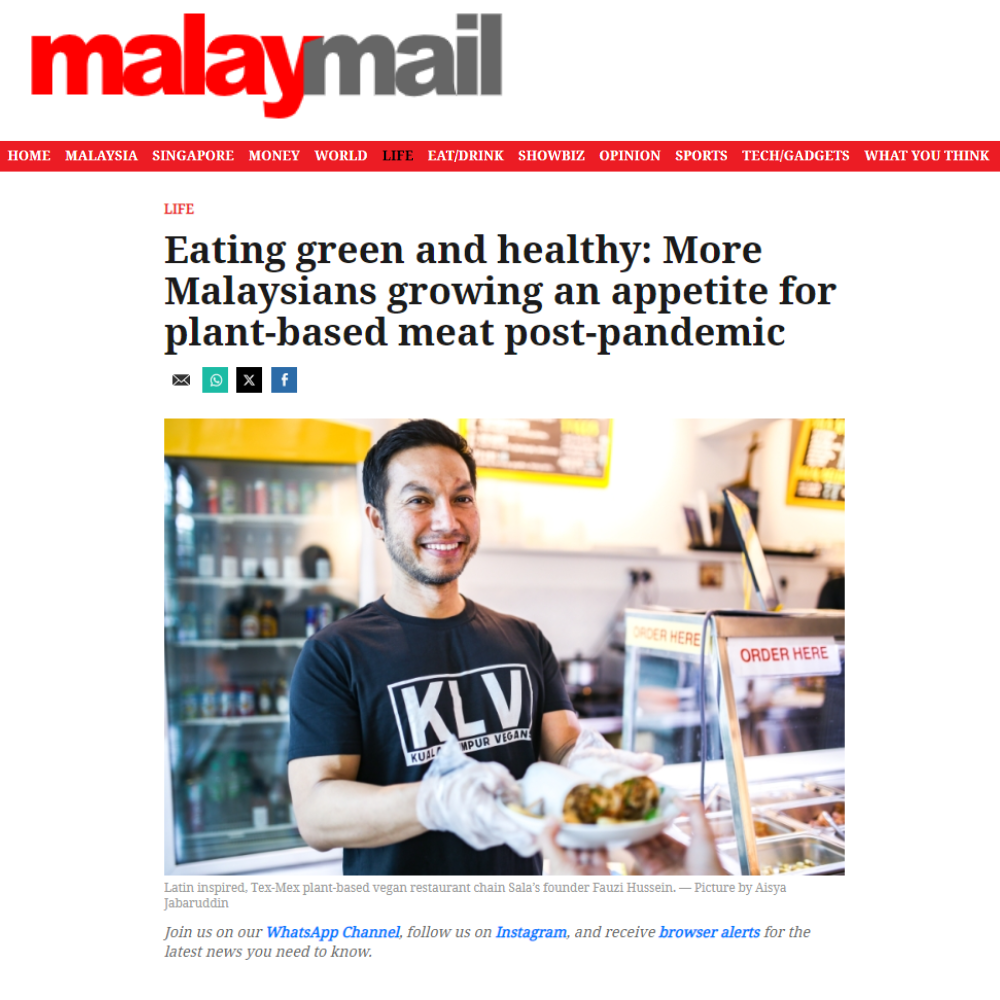
KUALA LUMPUR, Jan 3 — Some 2,000 years ago, Buddhist monks in ancient China created tofu from soy milk as a substitute for meat.
The humble tofu has now led to a multi-billion dollar plant-based meat industry that some say could become a staple protein source when climate change intensifies.

In Malaysia, plant-based meat has been gaining traction over the years, enticing even ardent meat-lovers.
At The Hungry Tapir, a famous vegan restaurant with a cocktail bar in the city, almost 80 per cent of the patrons are not even vegetarians or vegans.
“They love their meat but they are also tempted to try plant-based cuisines,” said Makissa Sophia Smeeton who runs the restaurant with her mother and brother.
Shocked by the environmental cost of animal agriculture, Smeeton turned vegan when she was a graphic design student in London eight years ago.
Now, Smeeton and her team dole out a variety of hearty vegan meals at The Hungry Tapir and LaGula - another vegan outlet that she started last May.
“The ‘Ay-am’ Geprek Burger, made from plant-based chicken patties, is one of our best sellers.
“It’s really nice to see people understand that they don’t need to eat meat for every meal. This small change will go a long way,” she said.
Likewise, Latin inspired, Tex-Mex plant-based vegan restaurant chain Sala founder Fauzi Hussein shares a similar aspiration.
Fauzi expects plant-based meat to gain a stronger footing in the country with more people adopting plant-based diets post-pandemic and increasing climate awareness.
“Compared to seven years ago when I started Sala, plant-based meat prices have reduced by 50 to 60 per cent, thanks to more local brands penetrating the market.
“This has allowed us to serve more affordable plant-based meat cuisines,” he said.
Fauzi, who currently operates four Sala restaurants, turned vegan due to health concerns and said veganism has made him more compassionate towards animals.

Picture courtesy of Dr Rassetha Vani
Lower cholesterol in plant-based meat
Nutritionally, plant-based meat contains lower cholesterol levels and higher polyunsaturated fatty acids, or the "good fats”, which can boost an individual’s health status.
Associate Professor Ts ChM Dr Raseetha Vani Siva Manikam said certain plant-based meat have also been fortified with vitamins that cannot be found in real meat.
“Although sodium is used to process and preserve plant-based meat, the ingredients used are food-grade and safe for consumption.
“However, when preparing the food, it is healthier to grill plant-based meat rather than deep frying in oil,” the food science and technology expert from the Faculty of Applied Sciences in Universiti Teknologi MARA (UiTM) said.
She advised consumers to check the sources of ingredients used in plant-based meats, especially for people with allergies and those on a restricted diet plan.

Picture courtesy of GMG
Keeping it sustainable
In 2016, a study by the Oxford Martin School said global food-related emissions would reduce up to 70 per cent by 2050 if the whole world turns vegan.
In 2018, academicians Joseph Poore and Thomas Nemecek reported that every 100g of protein in beef emits 49.9kg of carbon dioxide.
By contrast, producing 100g of protein from peas emits only 0.4kg of carbon dioxide.
Malaysian food technology company GoodMorning Global Group (GMG) has developed an even more sustainable plant-based meat version - Wondermeat.
Wondermeat, the country’s first dry mix complete nutrition plant-based meat, primarily consists of soy and pea proteins.
GMG chief executive officer Dr Charles Cheng Fang Chin said plant fibres within the product bind themselves to become meat fillers when mixed with cooking oil or water.
“We also plan to diversify Wondermeat’s protein profile by including yeast and mushroom protein.
“Since Wondermeat is in dry mix form, underprivileged groups without cold storage facilities can still purchase and store it.
“It also has a longer shelf life of up to two years, compared to frozen plant-based meat, which can only last between 12 to 18 months,” he said.
Charles noted that more restaurants and caterers in Malaysia are opting for plant-based meat to replace actual meat, especially due to the jump in meat prices.
“In the next 20 to 30 years, plant-based protein will be the most affordable and sustainable choice.
“But, when rising sea levels shrink agricultural lands in future, the next mainstream solution will be microbial protein,” he said.
Reported by: Malay Mail 03.01.2024
Full Article: https://www.malaymail.com/news/life/2024/01/03/eating-green-and-healthy-more-malaysians-growing-an-appetite-for-plant-based-meat-post-pandemic/110380